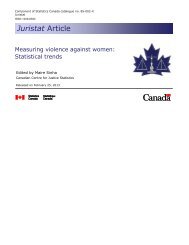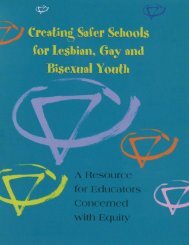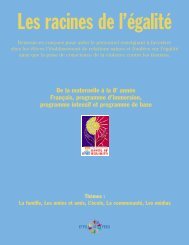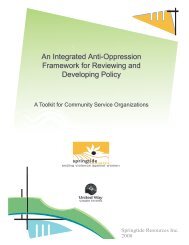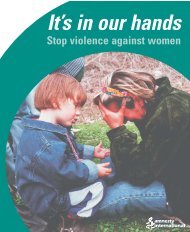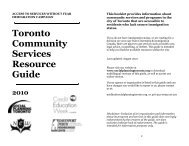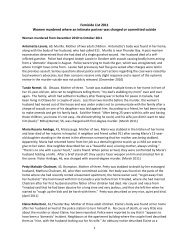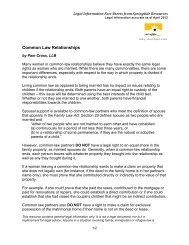Little eyes, little ears - Agence de la sante publique du Canada
Little eyes, little ears - Agence de la sante publique du Canada
Little eyes, little ears - Agence de la sante publique du Canada
Create successful ePaper yourself
Turn your PDF publications into a flip-book with our unique Google optimized e-Paper software.
<strong>little</strong> <strong>eyes</strong>,<strong>little</strong> <strong>ears</strong>Pre-schoolers 3, 818For this age group, what theyexperience is more real thananything you tell themA child aged three to five y<strong>ears</strong> who sees violenceand other loud conflict may:• worry about being hurt and may have nightmaresabout being hurt• believe they caused the “fight” bysomething they did• hope that a TV character or super hero willcome and save themtry and stop the “fight” by, for example, yelling• “tune out” the noise by focussing on somethingelse like toys or television• be distressed when Mommy is upset but feelbetter when she seems okay again• be confused if Daddy is gone and worry thatMommy may leave tooBecause of their egocentric nature, they might b<strong>la</strong>methemselves for bad events such as when their parents“fight.” Pre-schoolers are easily upset by changes to dailyroutines and separation from cherished items such asb<strong>la</strong>nkets or pets. It helps to maintain or re-establishcomforting routines such as bedtime sche<strong>du</strong>les. Thepresent is more important to pre-schoolers than the past.Children of this age need to hear thatwhat happened was not their fault, theyare still loved, and that importantfeatures of daily life will go on even iftheir families have changed or moved.-How might violence at homeshape normal <strong>de</strong>velopment? 3, 8KEY ASPECTSOF DEVELOPMENTLearn how to expressangry feelings and otheremotions in appropriate waysExperiences and observationsmost salient in formingmeaning in their worldOutcome ismore salientthan the processThink in egocentric waysForm i<strong>de</strong>as about gen<strong>de</strong>rroles based on socialmessagesIncrease physicalin<strong>de</strong>pen<strong>de</strong>nce(e.g., dressing self)POTENTIAL IMPACTOF DOMESTIC VIOLENCElearn unhealthy ways toexpress anger andaggressionconfused by conflictingmessages (e.g., what Isee vs. what I am told)may be distressed byperceived unfairness,father's arrest and/ortrip to sheltermay attribute violenceto something they didlearn gen<strong>de</strong>r rolesassociated with violenceand victimizationinstability may inhibitin<strong>de</strong>pen<strong>de</strong>nce; may seeregressive behavioursFind a two-page handout for mothers ofpre-schoolers on page 52 of Helping ChildrenThrive / Supporting Woman Abuse Survivors asMothers (2004). [www.lfcc.on.ca]




